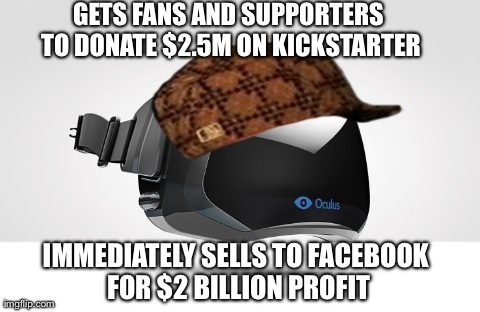Sour grapes. In the era of multi-billion-dollar acquisitions and high expectations, it’s easy to have them. But what has driven the mass outrage against Oculus and their sale to Facebook for a cool $2 billion? The endless fear of the sellout, the group or person or brand that catered to one market and then, sensing the end of the road, turned to the wide world and re-rigged itself for mass acceptance.
To be clear, Oculus owes its backers exactly one thing: a headset. They don’t owe them unswerving loyalty, everlasting penury, or a bow and a scrape at gaming conferences. The expectation that Oculus thought about its audience at all is ludicrous. In the choice between the cool kids wanting the TV and the nerds wanting rock tumbler, the nerds will always pick $2 billion.
Another thing is also clear: the idea that Facebook will do anything but eviscerate Oculus, spread its developers through its cavernous guts, and spit out the husk with a shrug is laughable. If Oculus ships product, it will be the last Oculus product backers will own. The next product that will come – if it comes at all – will be a way to “Like” physical advertisements in the real world to gain a reward of nutrient slurry from a Facebook-branded Camelbak.
But this is the Internet and so scream we must. First, we have some very measured – and unmeasured – Twitter back and forth. Joel Johnson, thankfully, explains the horror quite ably:
https://twitter.com/joeljohnson/status/448787056416657408
https://twitter.com/joeljohnson/status/448781179194724352
Then we have the real complaint: that Oculus was supposed to be about gaming and, instead, it’s now about VR. For two years Oculus has been a gamer’s nirvana, allowing you to use a virtual toilet or play Half-Life 2 in glorious 3D. It was supposed to be a way to become completely alone and immersed in the game (a prospect, sadly, that says more about the gaming culture than the technology). Now, however, Facebook wants to pull a Google and build a way to put their product in front of as many faces as often as possible. Gamers know instinctively that this is a bad idea. Just as they only rarely accept the presence of advertising in games – and suffer for it by paying $60 for an optical disk and some plastic packaging – they know it’s not fun to be marketed to in an immersive environment. It’s like being pulled out of a dream to be sold a Coke.
And then what of this odd conspiracy theory that Facebook employees are already Astroturfing forums to spread the good news. This, as we see, is pretty damning:
But fear not! There is no comment army ready to do Zuck’s bidding. One of the users denies everything and, we must remember, that in the war of aggrieved versus aggrieved, there are two sides. As angry as the world is at Facebook, there will be some supporters who shrug and say “Hey, it’s a good idea.” In the fog of war, many things are said that are eventually forgotten. In the end, these wars don’t matter. Something more interesting will come along – the Morpheus headset will probably be the winner here (read Greg’s take) – and we’ll all have to pour another one out for a fallen VR solution for pure gaming. It’s hard, I know, but as we hurtle into the future there will always be some casualties. And you can always cancel your pre-order.


